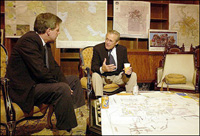
US Defense Secretary Donald Rumsfeld toured northern Iraq on Friday to access the security need as chaos in the war-torn country continued to cause casualties.
On Friday morning Rumsfeld traveled north to Tikrit, hometown of ousted Iraqi President Saddam Hussein, to visit US soldiers stationed there.
CNN television showed a military convoy supposedly escorting the secretary drove on an uphill highway into a castle on top the mountain, where used to be a palace of Saddam and now used as US military base.
He was seen talking and shaking hands with US soldiers, trying to boost the morale by stressing that their task "is important, and it is succeeding."
The US 4th Infantry Division, deployed around Tikrit, 160 km north of Baghdad, has been plagued with hostile fires and bombings as they mounted operations hunting for the former Iraqi leader and curbing attacks believed to be conducted by Saddam loyalists.
Later the secretary visited the northern major city of Mosul, 300 km further north, where he was offered by the 101st Airborne Division a bird's eye view of the site where Saddam Hussein's sons were killed.
Uday and Qusay were killed in a fierce battle in July after an Iraqi informer led guided the US troops to the pair's hiding house in Mosul, while their father has been believed still at large.
Rumsfeld told Iraqis in a taped interview on Friday night that US troops will not leave the country although they faced troubles of all kinds of attacks.
Rumsfeld flew in Baghdad on Thursday on a previously unannounced visit to discuss with his top military brass a new security plan which is aimed at cutting US losses by enlisting multinational peacekeepers to Iraq without abandoning US overall control.
US top administrator in Iraq Paul Bremer, after accompanying Rumsfeld in the day, told reporters that it is "realistic" to expand the current 5,000 Iraqi security force to 100,000 in one year.
The security personnel would include a 15,000 strong army, a maximum of 25,000 border guards and a police force slightly less than 75,000, he added.
In Baghdad, three Iraqis were injured when a group of unidentified gunmen fired at a Sunni mosque on Friday morning, witnesses said.
The casualties were not heavy as few people were performing morning prayers at the Gubai mosque in northern Baghdad when the shooting burst out.
The wounded were evacuated to hospitals for treatment, but the perpetrators fled the scene.
Attacks on mosques have become often since a double-car bombing killed leading Shiite cleric Ayatollah Mohammed Baquer al-Hakim ata holy shrine in the southern Iraqi city of Najaf last week. A total of 83 were killed and several hundred others wounded in the terrorist attack.
On Wednesday morning, Sayd al-Wa'ith, a representative of the most prominent Shiite cleric in Iraq Grand Ayatollah Ali al-Sistani, escaped an assassination attempt when he was targeted at a holy mosque in Baghdad. The gunmen were caught and handed over to the Iraqi police for investigation.
The surge of violence has prompted concerns over a sectarian civil war among Iraq's religious factions, but leading clergymen have rejected the prospect, boasting the unified mainstream.
On Friday, a US civilian working for Kellogg, Brown and Root, a subsidiary of oil giant Hallburton Co., was killed in a shooting at a convoy in Baghdad.
Meanwhile officials said a British bomb disposal expert was killed and his Iraqi assistant injured when their vehicle was attacked by gunmen in northern Iraq on Thursday.
Over ten Iraqis were killed and dozens got sick overnight by unknown gas leaked at a plastics plant outside Baghdad. It was not clear of the cause of the leakage.
(Xinhua News Agency September 6, 2003)
|

